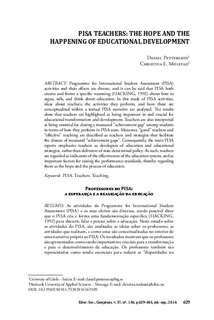PISA TEACHERS: THE HOPE AND THE HAPPENING OF EDUCATIONAL DEVELOPMENT
Journal article, Peer reviewed
Permanent lenke
http://hdl.handle.net/11250/2430927Utgivelsesdato
2016Metadata
Vis full innførselSamlinger
Originalversjon
Pettersson, D. & Mølstad, C. E. (2016). PISA Teachers: The Hope and the Happening of Educational Development. Educação e Sociedade, 37(136), 629-645. doi: 10.1590/ES0101-73302016165509 10.1590/ES0101-73302016165509Sammendrag
Programme for International Student Assessment (PISA) activities and their effects are diverse, and it can be said that PISA both creates and forms a specific reasoning (HACKING, 1992) about how to argue, talk, and think about education. In this study of PISA activities, ideas about teachers, the activities they perform, and how these are conceptualized within a textual PISA narrative are analyzed. The results show that teachers are highlighted as being important in and crucial for educational transformation and development. Teachers are also interpreted as being essential for closing a measured ”achievement gap” among students in terms of how they perform in PISA tests. Moreover, “good” teachers and “effective” teaching are described as teachers and strategies that facilitate the closure of measured “achievement gaps”. Consequently, the main PISA reports emphasize teachers as developers of education and educational strategies, rather than deliverers of state determined policy. As such, teachers are regarded as indicators of the effectiveness of the education system, and as important factors for raising the performance standards, thereby regarding them as the hope and the process of education.
Beskrivelse
This is an Open Access article licensed under a Creative Commons Attribution License, Attribution-NonCommercial 4.0 International (CC BY-NC 4.0). The article can be found on publisher's website by following this link: http://www.scielo.br/scielo.php?pid=S0101-73302016000300629&script=sci_arttext&tlng=en
